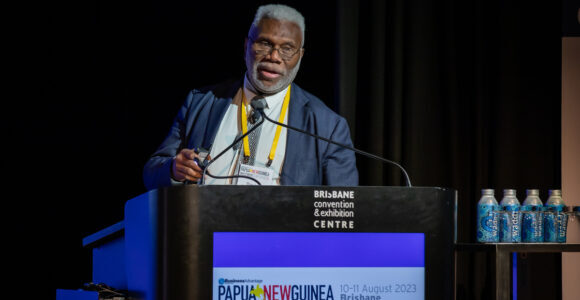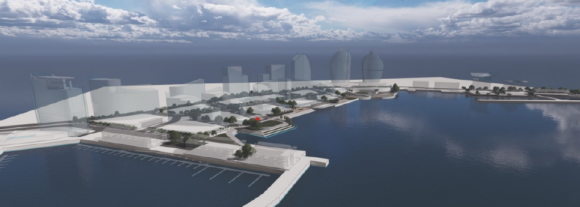Some key Papua New Guinea state assets, including the site of Port Moresby’s old port, are being readied for redevelopment, with private sector investment being sought. The move is being guided by a new investment strategy from state holding company, Kumul Consolidated Holdings.

Kumul Consolidated Holdings’ Professor David Kavanamur. Credit: BAI/Stefan Daniljchenko
While its primary role is to manage and oversea the country’s state enterprises, including its main utilities and national airline, state-owned Kumul Consolidated Holdings (KCH) is also seeking to revive and redevelop some of Papua New Guinea’s dormant state assets.
In so doing, according to Managing Director Professor David Kavanamur, it is hoping to work more closely with private investors.
‘We are moving away from one hundred per cent state ownership and working on strategies to improve state-owned enterprises’ (SOEs’) contribution to GDP: to sweat the assets, to improve returns,’ he told the recent 2023 Business Advantage PNG Investment Conference.
‘Now for the first time, you’ve got an investment strategy – and clear strategic asset allocation built into the investment strategy – to guide the government’s investment.’
Reviving assets
While the partial privatisation of Telikom PNG is an ongoing project, KCH is also now seeking to partner with the private sector to redevelop some of its land-based assets.
The big ticket item is undoubtedly Port Moresby’s old port site – vacant since 2018, when the port relocated to Motukea Island.
‘We are looking at different modalities to partner with the private sector: franchises, public private partnerships, build-own-operate-and-transfer, joint ventures, consortia and so on’
The waterfront site offers the opportunity to connect the busy suburb of Konedobu with Port Moresby Town and the planned Paga Hill Special Economic Zone.
KCH is considering a number of redevelopment options for the site, aligned with the National Capital Development Commission’s Urban Development Plan. These include developing the precinct into a commercial and residential area, a tourism destination or a mixed-use development.

A simulation of the old Port Moresby port site redeveloped. Credit: KCH
KCH is also looking to attract private sector investment in two large agricultural assets owned by its Kumul Agriculture subsidiary: the 2300-hectare Dylup Plantation in Madang Province and the 1089-hectare Cape Rodney Estate in Central Province.
Dylup, about hour north of Madang, has a mix of existing cocoa and copra plantations and undeveloped land, some of which has reverted to forest.
According to KCH, there is potential for hemp and tropical fruit growing, as well as downstream processing at the site. It has engaged a US-based agricultural consultancy to develop a business plan for the plantation.
‘With that business plan, we’re going to go back to market and you can bid for the opportunity to partner or invest in the plantation,’ said Kavanamur.
Cape Rodney is currently the site of a rubber plantation and factory but also has vacant land suitable for a variety of crops, including rubber, cocoa and oil palm.
Investment models
While KCH will hold onto an equity interest in these redevelopment projects in return for making the land available, Kavanamur says it is looking to the private sector to actually run with these projects and is one to exploring different investment models.
‘We are looking at different modalities to partner with the private sector: franchises, public private partnerships, build-own-operate-and-transfer, joint ventures, consortia and so on,’ says Kavanamur.
KCH already has a track record in this area, with minority stakes in two joint ventures with Innovative Agro-Industry: a 20 per cent equity in the successful Ilimo Dairy Farm outside Port Moresby, and a 40 per cent equity in Sepik Fresh.








Speak Your Mind